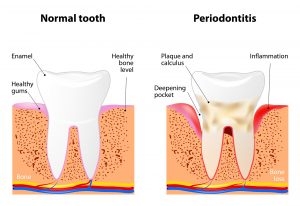January 9, 2018
Periodontitis, or gum disease, can be a highly pervasive problem that, once it settles in, is difficult to get rid of. Fortunately many treatment options exist, but in order to prevent periodontitis or halt its spread, it can be important to know the factors that can cause or worsen it.
Who Is At the Highest Risk for Gum Disease?
A number of factors can combine to increase your risk for gum disease. Some of these factors may be inborn or environmental and beyond your control, but others occur as a result of general habits and activities you may be involved in. Those at risk for gum disease include:
- People who smoke or use chew tobacco
- People who do not brush or floss their teeth frequently enough
- People with improper brushing technique that leads to gum bruising, bleeding, and damage
- People with low immune resistance or degenerative disease
- People at risk from inherited genetic factors
What Are the Effects of Gum Disease?
Gum disease can start off as simple bad breath and tender gums, but can lead to serious health complications. One of the worst risk factors is your heart, should infections from periodontitis spread through your bloodstream to cause heart disease. Other consequences include tooth loss and bone decay, but the more the disease progresses the further you are subject to risk of stroke, kidney disease, dementia, various forms of cancer, and diabetes. Pregnant women may also face the possibility of prematurely induced labor and other complications to their pregnancy.
How Can Gum Disease Be Treated?
A qualified periodontist such as Dr. Withers can speak with you regarding your options for treatment. Treatment may involve various types of grafts, extensive deep cleaning to remove pockets of infection, oral flap surgery, and planing. Contact us in Fairfax, VA today to schedule a consultation, and address the underlying cause of your gum disease.
